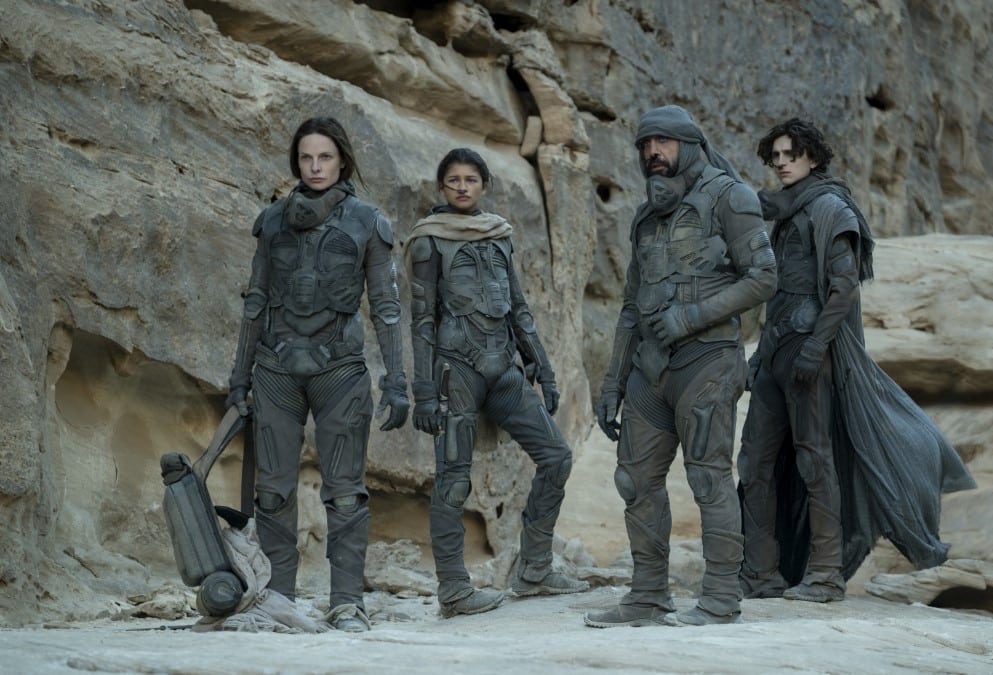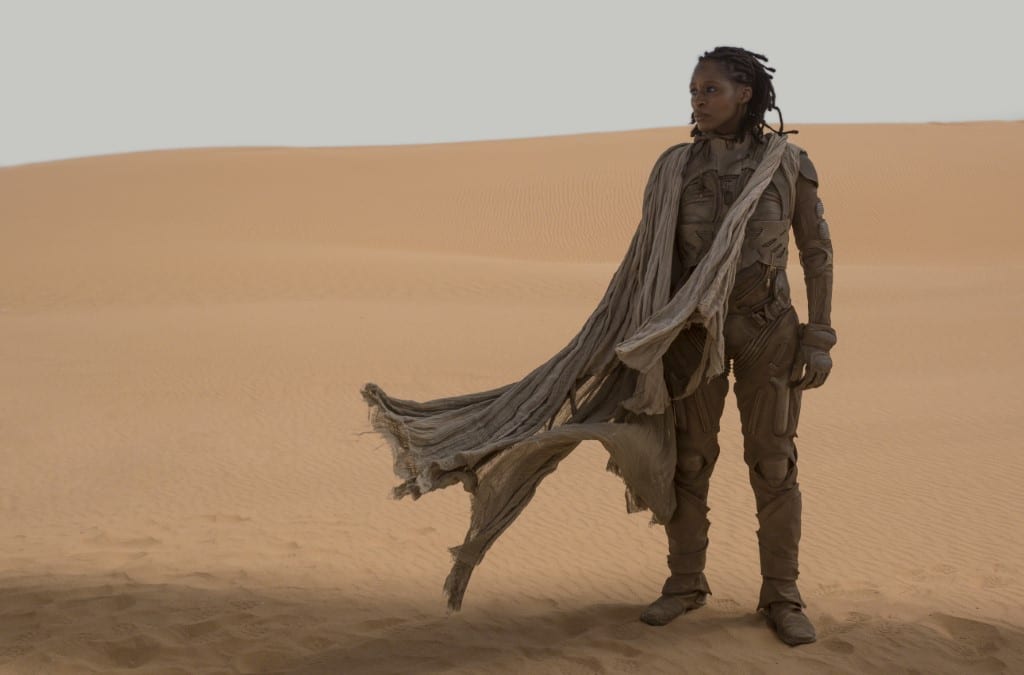Read also:
How to Watch FX Live Without CableHow To Watch AMC Without CableHow to Watch ABC Without CableHow to Watch Paramount Network Without CableDenis Villeneuve’s adaptation of (the first half of) Frank Herbert’s novel is as ambitious in scope as it is difficult to unpack.
When I first heard the announcement of a new adaptation of Frank Herbert’s magnum opus Dune, I think I might have groaned and said, “God, not again.” Even with the cult followings that Lynch’s now-disowned 1984 version and SyFy’s plodding 2000 miniseries have amassed, there has yet to be a version that had the kind of mass appeal that gets butts in seats.
And no wonder. Dune is not the most accessible of stories. Set in the far-distant future when Earth is no more and humanity has spread out across the galaxy, Herbert’s Duniverse is a strange mix of old and new. Humanity exists as a feudal society with noble houses ruled by an Emperor. It’s a society where the Spacing Guild holds the monopoly on space travel and the Bene Gesserit sisterhood spin political webs while protecting their centuries-old breeding program. Politics, ecology, eugenics, colonialism…Dune is a lot of story, a lot of theme, to cram into a two-and-a-half-hour movie. And I haven’t even mentioned the Chairdogs!
Other directors have dreamt, tried, and (thankfully) failed to deliver an adaptation. Enter Denis Villeneuve, who previously breathed new life into an old, much-beloved property with the slow but thoughtful Blade Runner 2049. Denis and co. stacking the cast with a slew of A-listers like Oscar Isaac, Jason Momoa, Zendaya, and Timothée Chalamet made it easy to picture the hype to come. The hype, thankfully, was warranted.
There is no hand-holding through the setup of this film. Instead, the viewer is thrust into the middle of the story, even before a single studio logo appears on screen, with a growling and guttural voice (or rather, Voice) telling the viewer about Dreams. In particular, much import has been placed on the dreams of young Paul Atreides (Chalamet), son of Duke Leto Atreides (Isaac). Chalamet plays the young Duke in waiting with a teenaged sensibility: brooding one moment, snarling the next, only softening long enough to look adoringly at his father.

While this portrayal may grate on some viewers, it’s important to remember that Paul is all of fifteen years old when these events transpire. “A great man doesn’t choose to lead,” Leto says to his son. “He’s called to it.” It’s a lesson that Paul doesn’t understand yet, standing on the windswept rocks overlooking his oceanic homeworld, but will before the two-and-a-half-hour runtime is up.
Leto, played with brilliant empathy and heady, earthy magnetism by Isaac, is a leader who understands where true power lies. Not in money, or in resources, but in people. Leto inspires an almost fanatical loyalty in his men, like Gurney Halleck (Josh Brolin) and the Atreides swordmaster Duncan Idaho (Momoa), who seems to be the closest thing young Paul has to an actual friend. Leto’s integrity and charisma are such that even his consort, Lady Jessica (Rebecca Ferguson), defied the orders of her sisterhood to give him a son. A son who now dreams of possible futures.
If you remember the enormous alien pods in Arrival or the Dalí-inspired spider that hovered over the apartment blocks of Toronto, you know that Villeneuve is the rare director who truly grasps the power of scope, both in terms of storytelling and of visuals, and how one informs the other. Dune transitions from lofty, open-air rooms to cramped vehicles and billets like lungs expanding and contracting with every breath. Large ships pour out of the massive, tubular Heighliners of the spacing guild, which, in turn, echo the giant sandworms that move in the oceanic depths of Arrakis’s desert. More often than not, scenes set in these massive spaces feel all the more dangerous, while the sweaty confines of a two-person tent become cloying with tension. The grand, sweeping shots of both rain-drenched Caladan and the sterile, almost crystalline desert of Arrakis are so astounding you forget there are characters on screen.
Villeneuve is the rare director who truly grasps the power of scope, both in terms of storytelling and of visuals, and how one informs the other.
While the story moves along at a nice pace, there were still times when Villeneuve’s dazzling visuals overwhelmed the plot. If there is any fault to be found in Dune, it’s there. The story can, at times, feel flat compared to the beauty of the landscape, the breathtaking shots composed by DP Greig Fraser, and the pounding, ululating score by Hans Zimmer. Still, overall, this adaptation manages to do what none of the previous adaptations have: it gives context.
Yes, Paul is a brat, but seeing his spice-induced visions—both compelling and repellant—at least gives him a reason. What person, let alone a hormonal teen, wouldn’t be a little nuts with a holy war playing itself out in their heads? After one of Paul’s visions, Leto’s brusqueness with Jessica could, on the surface, feel cold, even cruel. Seeing firsthand the genuine danger Paul’s prescience puts him in, though, reveals a father who is truly terrified for his son’s life and well-being. Context isn’t just valuable in an adaptation of Dune; it’s absolutely necessary.
Standing opposite Duke Leto, Stellan Skarsgard’s Baron Harkonnen is a genuinely terrifying adversary. He’s no giggling madman, but a ruthless opponent, cold and sharp as a surgeon’s scalpel. While the fat suit is…not great, it does at least lend something of a humanizing element to this antagonist. It doesn’t make him less unsettling—far from it—but serves as a reminder that tyrants come on in all shapes and sizes, be it a hedonistic fat man or a little sapling of a boy.

Not enough can be said of Sharon Duncan-Brewster’s performance as Dr. Liet Kynes. Written in the books as a man, Duncan-Brewster lends a wariness to the role, a craftiness, and a titanium spine. Paul sees something in her that he both respects and fears, and she seems to see the same in him. Despite (or more likely, in spite of) the initial grumbling from fanboys over the feminization of the role, Duncan-Brewster’s Liet stands out as the bravest in a film packed with heroics and sacrifice.
Even with such strong performances, spectacular sets, and heart-stopping action sequences (hello, Shai-Hulud, you big beautiful boy), Dune never gets too bogged down in its own mythos, and I can’t help but wonder if that’s a good thing or not. The ending, not wrapped up but paused at a vital junction in the story, hinges on the success of this movie to get Part II greenlit.
While an incredibly fun and engrossing film in the moment, it doesn’t leave much of an aftertaste. I found nothing objectionable in Dune (I’m not getting into the white savior discussion here, but trust me, I have a lot to say about it), there’s also nothing much you take with you when you leave. Maybe a headache from all of those drums, Hans.
Perhaps when seen in concert with Part II, Dune will be better appreciated for what it is. Just a beginning.
Dune rides the worm into theaters and HBO Max October 22nd.